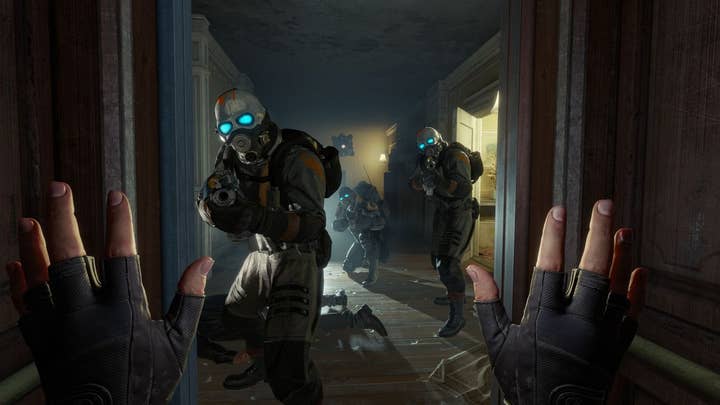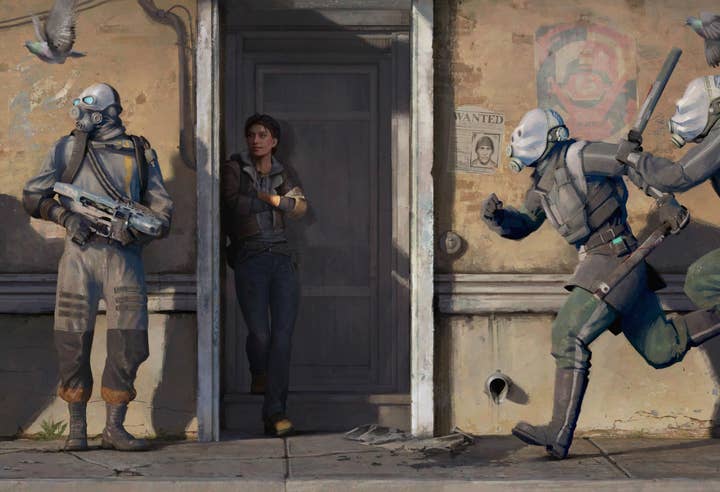Can Alyx pull VR out of its niche? | Opinion
Half-Life: Alyx is driving headset sales before it's even released -- but it's going to take a lot more to make VR into a viable market for AAA games
Given how many people have been waiting for so very long for a new Half-Life game, it's entirely unsurprising that the upcoming Half-Life: Alyx is making some pretty big ripples in the pond even before its launch.
One of the more notable of these is its impact on the Valve Index, the company's high-end VR headset, which had struggled to make its mark prior to the Alyx announcement. Now, it's sold out almost everywhere, with keen consumers rapidly burning through stock of the device towards the end of last year. Superdata reported that Valve sold 103,000 Index headsets in the final quarter of the year, but given the inventory issues, it's hard to say what kind of numbers the device might have done if all of the consumer demand could have been satisfied.
These numbers are pretty impressive when you consider that the Index is a luxury, high-end headset that's priced to match -- it's often cited as a thousand-dollar headset, but in many territories consumers would have to spend significantly more than that to buy the full headset, controller and sensor kit required to get the complete experience.
However, it's still important to bear in mind that this remains a tiny, niche market relative to the console, PC or mobile device markets. Even for the best-selling VR headsets, a stellar quarter globally pales in comparison to the weekly sales of something like Switch or PS4 in a single decently performing territory, let alone the gigantic figures posted week after week for devices like the iPhone. I point this out not to bash the VR market, but because it's a reality; VR remains a niche within a niche, and that's a big part of the commercial equation developers and publishers have to grapple with when deciding where it sits in their plans.
"The ability of Half-Life: Alyx to drive a huge sales spike for a very expensive headset before the it even launches is an important data point"
Growing that niche into something bigger and more commercially viable is pretty much top-of-mind for everyone involved in VR, of course -- and on that front, the ability of Half-Life: Alyx to drive such a huge sales spike for a very expensive headset before the game even launches is a pretty important data point. VR thus far hasn't lacked for interesting software; a huge deal of effort, creativity and experimentation has been poured into software development on the various VR platforms, from low-cost mobile VR solutions via PlayStation VR all the way up to fully featured PC-based setups with motion tracking volumes and custom controllers of all sorts.
Along the way, a handful of titles have managed to pop over the parapet and genuinely get some cultural recognition within broader gaming circles, Beat Saber being perhaps the best example. But it's becoming increasingly clear that while commercial opportunities exist within the niche for creative, innovative titles (especially those that can be developed at low cost by small teams), actually widening the niche itself is going to take big, high-profile franchises, and lots of them.
It's not, of course, that there haven't been big franchises on VR before -- you can play as Batman in VR already, for example, which created a bit of a splash when it first appeared -- but almost all of the major IPs and franchises that have appeared on VR have taken the form of what is somewhat euphemistically described as an "experience" rather than an actual game. A VR "experience" is something bite-sized or otherwise trimmed back, a short-form chunk of content that puts you into a character's shoes to experience a certain range of interaction within a relatively limited environment; the digital equivalent of a theme park ride, in essence.
"VR lacks the cornerstone titles which consumers can easily and directly assess as offering value for money in a way they find familiar"
In general, if you want to try out an IP or franchise you enjoy in its VR incarnation, that's what you're restricted to -- with just about the only notable exception thus far being Resident Evil 7, which committed to a (rather brilliant) VR version of the entire game. Half-Life: Alyx, along with the upcoming Iron Man title for PSVR, promise to build upon that library of full-sized VR games based on big, popular IPs, but it would be pretty optimistic to describe this as anything like the floodgates being opened -- a cautious toe in the water might be closer to the truth.
Short or otherwise limited VR experiences are not a bad thing in themselves. There are quite a number of pretty convincing arguments that this is actually the format to which VR is best suited, given the rather cumbersome nature of the hardware required. Most consumers aren't especially keen on isolating themselves from their surroundings for very long periods of time, and the headsets tend to become pretty uncomfortable after a while as well. Bite-sized VR experiences, whether packaged as one-offs or as episodic content, are actually a pretty great format given these limitations.
They allow developers to experiment and innovate freely within these brief sandboxes, drive the rapid evolution of the medium and give players a steady stream of new ideas and experiences that keep VR fresh and relevant. From a commercial standpoint, however, short experiences have been a tough sell. Short experiences branded with popular IP seem to work very well in terms of driving footfall to out-of-home VR "theme park" type venues, but in terms of VR in the home, these titles just don't seem to be shifting headsets.

It's not hard to figure out why. Headsets are expensive -- even PSVR is a big investment compared to the cost of the console to which it tethers -- and consumers simply don't see the value proposition in a device whose primary function is going to be playing a bunch of brief "experiences" that only last a handful of minutes each. The software situation for VR is tricky from a market standpoint. It lacks the cornerstone titles which consumers can easily and directly assess as offering value for money in a way they find familiar.
"If this is both the beginning and the end of big-budget, major-franchise software support for Index, then it certainly won't be enough"
A full-size game from a beloved franchise is exactly what VR needs to square this circle -- or rather, quite a few full-sized games, from quite a few beloved franchises, launching with the kind of regularity you'd expect from a well-tended console's first-party exclusives. That's something consumers are perfectly used to shelling out cash in order to experience -- whether it's a new console or a PC upgrade, buying new hardware to play the latest and greatest in a series you love is a well-establihed and well understood consumer behaviour.
With the exception of Resident Evil, which clearly sold a truckload of PSVR headsets at the outset, this kind of content has been extremely rare for VR. The capacity of the Half-Life: Alyx announcement to shift something in the region of $100 million dollars' worth of high-end VR kit in the space of a couple of months demonstrates just how starved for this kind of content the market actually is.
The problem is that even with Alyx out there as a proof of concept, this remains a tough sell to developers. VR has a small installed base, matched with big technical and gameplay challenges; challenging to develop for, and the rewards for success aren't exactly the riches of Croesus. The solution, such as it is, is actually very simple -- there really needs to be someone in there throwing money at the problem.
This is how consoles get through the same challenge in their early months -- the platform holder throws money around to ensure there's enough content there to drive sales and make the platform viable -- but it's far from being a problem that's unique to consoles. VR headsets clearly have the same challenge; hell, Google's Stadia is currently butting right up against the same problem, and the only solution there will also be for a big fat wallet to be opened and money to be thrown into the hole until the consumer base grows to the point where the market is self-sustaining.
For Stadia, there's only one company that can do that (whether they're willing to is another question), but for VR a complicating factor is that there are quite a few companies who might reasonably fill that role, and there's a sense that nobody really wants to be the chump pouring money into the market just to benefit other people's businesses. Valve is leading the way with Alyx. Sony has also made some decent efforts with PSVR, though that's something of a walled-off garden that's removed from the rest of the VR market anyway.
It's what comes after Alyx, though, that counts. What Valve does next is likely reliant on the question of whether other companies -- notably Oculus' parent, Facebook -- also step up to the plate and start funding the kind of big-name, full-scale VR development that's going to be required to drag VR out of its niche. Alyx looks wonderful, but if this is both the beginning and the end of big-budget, major-franchise software support for Index, then it certainly won't be enough. Already, though, it's showing us what's needed; the only question is who will step up to actually do it.

